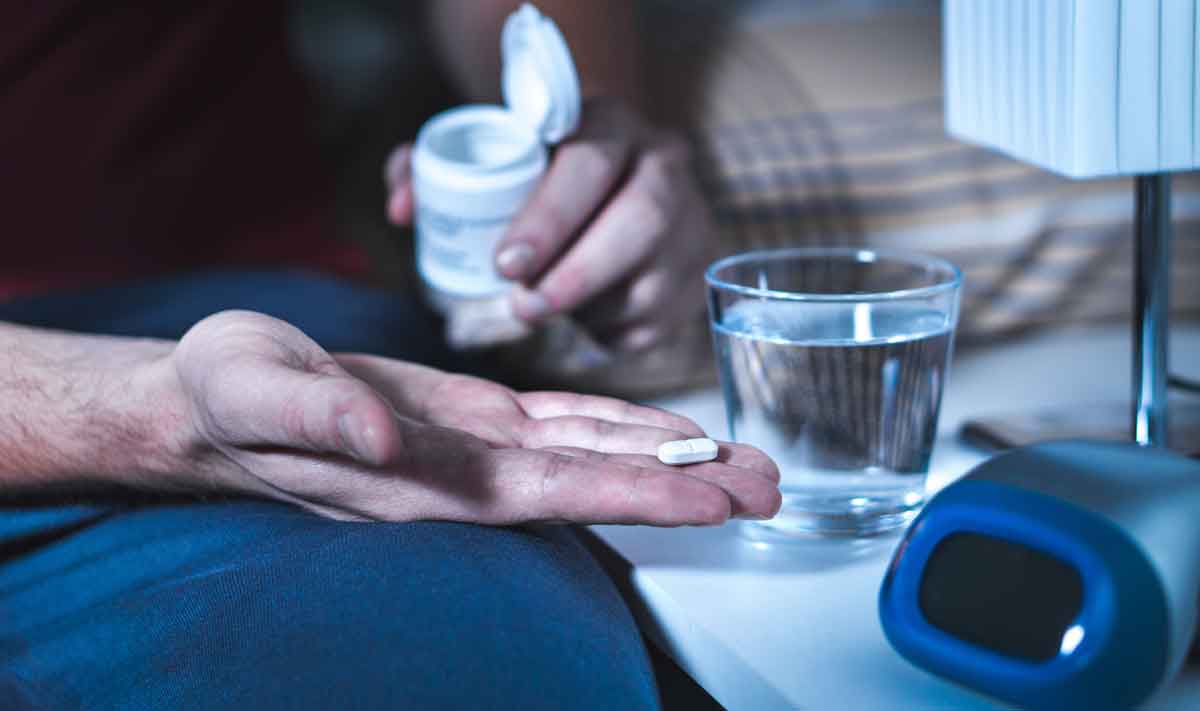
Anxiety Medication Interactions | Which Herbal Supplements Should I Avoid?
REPOSTED FROM GOODRX
WRITTEN BY DR. SWATHI
According to the Anxiety & Depression Association of America (ADAA), anxiety is the most common mental health condition in the U.S., and it impacts nearly 1 in 5 adults every year. Anxiety is a common feeling, but if that feeling is overwhelming or persists for more than 6 months, it could require medical attention.
There are different types of anxiety disorders, such as generalized anxiety disorder (GAD), social anxiety disorder (SAD), and post-traumatic stress disorder (PTSD).
Currently, it’s recommended that anxiety disorders be treated with certain prescription medications and/or psychotherapy. Many people also turn to complementary and alternative medicine options — such as a meditation or mindfulness practice, smelling essential oils, and taking herbal supplements — to help manage their anxiety.
But, given the chance that herbal supplements may interact with certain prescription anxiety medications, there are concerns for safety when combining the two.
In this article, we’ll cover certain prescription medications and herbal supplements often used to treat anxiety and when they shouldn’t be used together.
Which medications can be used to treat anxiety?
Anxiety is highly treatable, and many medications — such as antidepressants and benzodiazepines — are FDA-approved to treat different types of anxiety disorders.
Antidepressants
Selective serotonin reuptake inhibitors (SSRI) and serotonin-norepinephrine reuptake inhibitors (SNRIs) are considered to be first-choice antidepressant medications to treat anxiety because of their effects on a brain chemical called serotonin. SNRIs also influence a brain chemical called norepinephrine.
It’s thought that serotonin and norepinephrine may influence mood through their activity in certain pathways in the brain. This broad class of medications includes, but is not limited to:
- SSRIs: Fluoxetine (Prozac), escitalopram (Lexapro), sertraline (Zoloft), and others
- SNRIs: Duloxetine (Cymbalta), venlafaxine (Effexor), and others
Benzodiazepines
Benzodiazepines are a class of prescription medications commonly used to treat some anxiety disorders as well as insomnia and seizures.
These medications work in the brain by indirectly enhancing the action of a chemical in the brain called gamma-aminobutyric acid (GABA) — a neurotransmitter that has a calming effect — which helps lower anxiety levels.
A few commonly prescribed benzodiazepines are:
- Alprazolam (Xanax)
- Clonazepam (Klonopin)
- Diazepam (Valium)
- Lorazepam (Ativan)
When comparing this medication class to antidepressants, benzodiazepines act quicker in the body to reduce anxiety symptoms, but they should only be used for a short time. Unlike antidepressants, the U.S. Drug Enforcement Agency (DEA) classifies benzodiazepines as controlled substances, given their potential for abuse and addiction.
Other medications
Besides SSRIs, SNRIs, and benzodiazepines, other medications can also be prescribed to help alleviate anxiety symptoms. These can include:
- Buspirone (Buspar)
- Hydroxyzine (Atarax)
- Tricyclic antidepressants like amitriptyline (Elavil), nortriptyline (Pamelor), and doxepin (Silenor) — off-label use
- Other medications used off-label to treat anxiety disorders include gabapentin (Neurontin), pregabalin (Lyrica), topiramate (Topamax), and quetiapine (Seroquel)
Which herbal supplements interact with antidepressants?
This section covers some commonly used herbal supplements that may help improve anxiety symptoms and their potential interactions with antidepressants. Specifically, most of these interactions can cause serotonin levels to become too high. If there is too much serotonin in the body, it could lead to serotonin syndrome. This is characterized by symptoms such as:
- Heavy sweating
- Agitation or restlessness
- Confusion
- Rapid heart rate and elevated blood pressure
- Dilated pupils
- Involuntary muscle movements
Serotonin syndrome can get slowly worse, and people can become very sick if not quickly treated. Untreated, serotonin syndrome can be deadly.
Supplements that increase serotonin
There are many herbal supplements that have preliminary evidence for use, but they can interact with antidepressants, so they shouldn’t be taken together. These interactions can worsen the risk for side effects. But, in general, more published data is needed to fully determine the relationship between antidepressants and the supplements discussed next.
Rhodiola rosea: There are small studies that show that this herb that grows in arctic regions of the world may improve mild anxiety. Cases of serotonin syndrome, liver toxicity, and other side effects have been reported while taking Rhodiola rosea with antidepressants.
Bacopa monnieri: Also referred to as “brahmi” and “water hyssop,” this herb has been shown to help improve anxiety in healthy individuals while completing stressful tasks, and has been reported to potentially cause serotonin syndrome when taken with antidepressants.
5-hydroxytryptophan (5-HTP) and St John’s wort are also supplements that people may use to treat depression, which can occur at the same time as anxiety. While there is some evidence that these supplements may affect serotonin, so far, there is not good data to support their use for anxiety.
Which herbal supplements interact with benzodiazepines?
There are several herbal supplements that can interact with benzodiazepines, and they shouldn’t be taken together. These interactions can make side effects worse or they can decrease how effective a benzodiazepine is. These are discussed more below.
Supplements that may affect GABA
As mentioned, GABA is a naturally produced brain chemical that causes relaxation and other effects in the body. Benzodiazepines affect GABA receptors in the brain, and studies have shown that the herbal supplements listed below may also do the same.
There is a chance for increased or excessive sleepiness when taking these supplements with benzodiazepines. This can be dangerous, so it’s recommended to avoid the following supplements while taking a benzodiazepine.
GABA: There is not much evidence for oral GABA supplement use in improving anxiety. Since benzodiazepines affect the GABA receptors in the brain, there is a potential risk that oral GABA can interact with benzodiazepines, but more research is needed to determine this.
Valerian: This plant’s roots have been shown to help improve anxiety and insomnia in some studies. Some of the side effects reported include gastrointestinal (GI) upset, fatigue, as well as withdrawal symptoms from stopping the supplement.
Ashwagandha: This cornerstone herb of Ayurvedic medicine is thought to potentially decrease anxiety and stress and improve sleep. However, it may worsen the sedative effects of benzodiazepines.
Skullcap: There are many herbs referred to as skullcap, but Scutellaria lateriflora is the specific herb with some evidence showing that it may help improve mood and decrease anxiety. But, it may also worsen the sedative effects of benzodiazepines.
Chamomile: German chamomile — commonly consumed as a tea — has been shown in one study to be effective in reducing anxiety in people with generalized anxiety disorder. Chamomile may also worsen the sedative effects of benzodiazepines.
Passionflower: Even though it is called a flower, passionflower is actually a medicinal vine with some preliminary evidence that it may help improve anxiety before surgery or in people who have generalized anxiety disorder. Passionflower may also worsen the sedative side effects of benzodiazepines.
Hops: Used to flavor beer, this herb has been shown to help improve anxiety in healthy people. Hops can also worsen the sedative side effects of benzodiazepines.
Lemon Balm: There is some research that shows that this citrus-flavored mint plant may help improve anxiety and sleep. Lemon balm may also worsen the sedative side effects of benzodiazepines.
Kava: Small studies have shown that this herb may benefit people with anxiety disorders, but there are concerns for liver toxicity with its use over a long period of time.
Supplements that decrease effectiveness
While taking an anxiety medication, you’ll also want to be aware of any supplements that can lessen your medication’s effectiveness. For example, one supplement to be aware of is St. John’s wort.
St. John’s wort
Again, while it’s not fully known if St. John’s wort is effective for treating anxiety, it’s notorious for having interactions with many medications and other supplements.
Due to its influence on an enzyme system in the body that metabolizes many prescription medications, herbal supplements, and OTC products — called the CYP450 enzyme system — St. John’s wort can lower the effectiveness of benzodiazepines. This means that it makes benzodiazepines not as effective for relieving feelings of anxiety. Therefore it is not recommended that they be taken together.
What happens if I use a herbal supplement that interacts with my anxiety medication?
Whether or not you’re currently taking a prescription for your anxiety, it’s important to speak with your healthcare provider before starting any herbal supplement. This is to make sure there are no interactions with medications or other safety issues. Together, you can weigh the benefits and risks to decide what is the best step forward for treating your anxiety.
Are herbs safe, and do they work?
While many herbs have been used for thousands of years for various health conditions, there hasn’t been much modern scientific research done on humans. Unlike prescription medications, herbal supplements do not go through rigorous clinical trials to test how effective and safe they are. Many herbs have been studied in animals or in small studies with humans that are not up to high scientific standards.
For example, many of the studies done on herbs in this article were done in healthy people without anxiety, so it’s hard to say how well they may work in people who have an anxiety disorder. Many different doses were also tested, so it’s hard to translate the results into real-life scenarios. There is still a long way to go when it comes to making sure herbal supplements are effective and safe, and researchers are trying hard to do so.
Finally, just because something is natural does not mean it is safe. Since herbal supplements are not held to the same regulatory standards as prescription medications, there’s a chance that they do not contain exactly what their label says, or they may even be contaminated with heavy metals or other drugs.
The bottom line
When it comes to treating anxiety, there are a range of options, each with respective benefits and risks. Antidepressant medications and benzodiazepines are common medications that are prescribed for anxiety, but taking them with herbal supplements may worsen their side effects.
Herbal supplements have some evidence for use to treat anxiety, but more studies are needed to confirm how well they work and how safe they are, especially when taken with prescription medications. Supplements shouldn’t be used in the place of a prescription medication without the direction of a healthcare professional.
Deciding which is the right choice for you could seem overwhelming. If you would like to learn more, speak with your healthcare provider or pharmacist.











